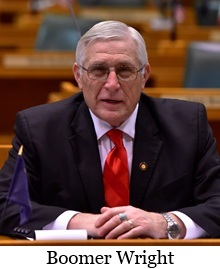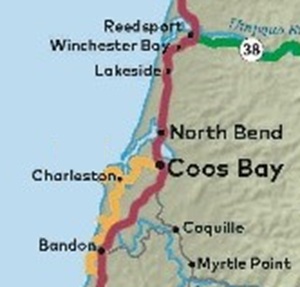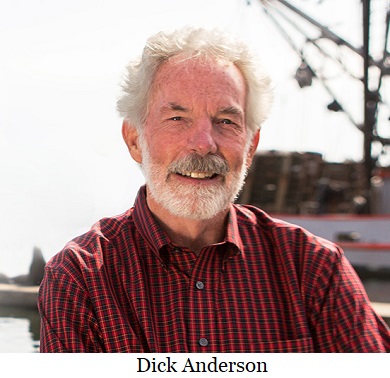Citizens just lost the right to vote on utility rate increases
Your right to vote on utility rates just vanished with the stroke of a pen.
The Legislature, in passing
SB 1062 has quietly stripped voters of their authority in three cities to approve utility rate increases, transferring that power directly to mayors and city councils. The legislation effectively overrides voter initiatives that had previously secured this authority within city charters.
Two Republican Senators, Anderson and Wright, spearheaded this significant change by sponsoring
SB 1062. This bill limits voters' right to choose, effectively betraying constituents in three specific cities: Bandon, North Bend, and Reedsport. Their action represents more than a procedural adjustment. It alters the balance of power between the voters and local government officials.
The state legislature's vote to approve this bill, which has a Democratic majority, was ironic because it represented an apparent attempt to circumvent established democratic processes.
The Players
The city officials of the three cities mentioned in the bill initiated the political play to discreetly remove voter authority without them having to follow any election requirement of sending a local notice to the voters. They knew they would never get the voters to give up their rate-setting authority, so they had Senator Anderson and Senator Wright do the dirty work. Officials from all three cities colluded with the local state senator and state rep to secure that authority through legislation, which some believe is validated in their testimonies on the bill.

In an excerpt from
testimony in favor of
SB 1062 written by the Mayor of Bandon, Mary Schamerhorn, she made promises assuring the legislators and voters the city officials would not abuse their authority when that was the reason the voters passed the City's rate-setting amendment in the first place.
"Senate Bill 1062 offers a thoughtful, targeted solution by restoring this critical authority to the cities of Bandon, North Bend, and Reedsport. If passed, our City Council is committed to ensuring that any future rate adjustments are based on objective, data-driven methodologies, supported by transparent and empirical cost analyses to justify the need and scale of such changes."
The City Manager of Reedsport Deanna Schafer complains about the City's electorate and how they have constrained the City in her
testimony on the bill.
"The City of Reedsport has been operating under the constraints of a citizen-initiated City Charter amendment that says that any creation or increase in any tax or public utility rate, shall not be effective unless ratified by a majority of the City's qualified electors who cast a ballot (May 2012). To compound the issue, the City had not had a water rate increase since 2006."
North Bend City Administrator David Milliron complains about the voters and then
attempts to claim that
SB 1062 will restore local authority. The voters of North Bend might think they were the locals and their vote was the authority.
"Why are we stuck? A 2020 charter change—passed by a simple majority—now demands a double-majority of all voters before the council can raise sanitary-sewer rates at all, and it caps any hike at the Social Security COLA—currently at 2.5 percent. One sentence wiped out the state-granted duty you gave us to keep this regulated utility safe. SB 1062 A is the narrow fix. It restores local authority—nothing more—for three coastal cities, costs the state nothing, and leaves every councilor fully answerable at the ballot box. With that power our governing body will move in clear, planned steps—so families can budget and our bay can stay clean."
Maybe Milliron should have made that passionate plea to the voters during the election, and the City would not have suffered from voters who had lost trust in the local authorities.
The Power Shift
Supporters of this legislation might argue that elected officials already represent voter interests, which was the argument made by the North Bend City Administrator, but it has not passed scrutiny.
When a charter requires direct voter approval for rate increases, utilities must make their case to every city voter. They must demonstrate genuine need and reasonable pricing. Without this check, the path of least resistance often leads to higher rates with less justification.
When all levels of government waste taxpayers' money, there must be political mechanisms of legal restraint the people can foist on authorities to check the balance of power. The reason the voters might reject a rate increase is due to the city’s spending habits in other areas. The people have a right to require fiscal responsibility.
The shift away from voter approval also removes a crucial transparency mechanism. Rate hearings before city councils typically receive minimal public attention, while ballot measures force broader public engagement and media coverage.
The Larger Pattern
This legislative action reflects a broader trend in both major parties of consolidating power away from direct democratic processes recognized in the state constitution. State legislators are willing to modify the locally established process by overriding local charter provisions established through public initiatives.
These policies give utility rate-setting authority to city voters but do not oppose our Constitutional Republic, where the federal system enacts law through the people's representatives. These mechanisms were complex to enact by average citizens who campaigned on the people's right to choose their style of government in their cities and counties under the authority of the State and the US Constitution. Oregon has a long tradition of voter-approved initiatives, demonstrating the state's unique respect for the people's right to choose where their authority resides.

Citizens should ask the simple question:
If utility rates do not require voter approval, what other local decisions will the legislators remove from public oversight?
The charter provisions requiring voter approval for rate increases for these three cities did not materialize by accident. A group of concerned citizens established those charters, and now their work was for naught. They recognized the potential for abuse when essential service pricing fell under the exclusive control of a small group of officials.
What Happens Next?
Bandon, North Bend, and Reedsport will immediately feel the impact after the governor has signed this legislation. City councils will gain unilateral authority to set utility rates without voter approval.
The longer-term consequences may include higher utility costs, decreased transparency in rate-setting processes, and further erosion of direct democratic participation in a local government's decision-making authority.
Citizens concerned about this shift should recognize the severe consequences of losing a direct voice in decisions that affect essential services and household budgets. The transfer of authority from voters to officials represents more than a procedural change. It alters the relationship between citizens and local government.
When politicians take away your vote on utility rates, they change who makes decisions and who those decisions ultimately serve.
--Rob Taylor| Post Date: 2025-07-19 11:12:58 | Last Update: 2025-07-19 19:03:24 |








